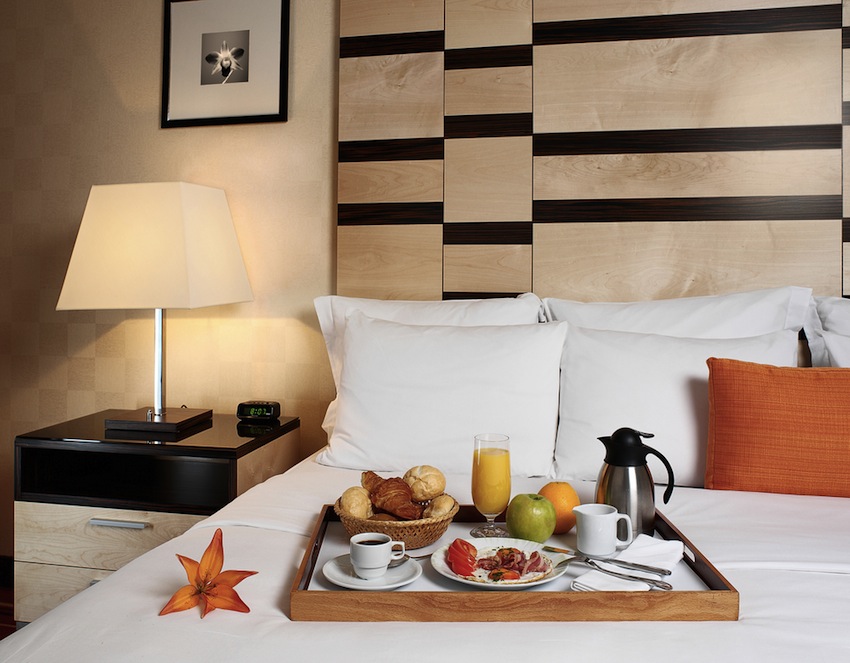Boston Hotels Aren’t Likely to Ditch Room Service Like New York

Room service photo via Shutterstock
Don’t worry, Boston: just because some New York hotels are opting out of room service doesn’t necessarily mean the practice could trickle down to the city’s own hospitality spots.
After the Hilton in Midtown, one of the largest destinations to stay in New York City, decided to scrap the idea of bringing food directly to the rooms of customers, eliminating more than 50 jobs in a move to “reinvent” the hotel industry, analysts claimed others could follow in their footsteps.
But those familiar with how the system works in Boston say it’s unlikely that it will become a national trend, let alone an envied industry practice. “It’s a convenience to the guest if they want it. The food aspect is there for them, so I don’t see it catching on. It’s a piece of the customer service experience,” says Paul Sacco, CEO and president of the Massachusetts Lodging Association.
Sacco says he spent years in the hotel industry before taking on his role as a lodging representative, and in that time, he says, what hotels have offered to guests staying the night has fluctuated dramatically from providing room service to trying other ways of catering to guests, such as setting up all-night kitchenettes. But the latest move out of New York City doesn’t seem like it will make a lasting impression, despite the predictions.
Patrick Moscaritolo, president and CEO of the Greater Boston Convention & Visitors Bureau, says unlike what happened with the mandatory baggage-check fees that airlines latched onto after several companies began charging, it would be the opposite for hotels. “Unlike what you saw with baggage fees and the airline industries, where they were competing on price and driving down the costs for flying passengers, hotels compete on service. I would find it really difficult for the very high-end brands, the luxury brands to basically move to a business model where they move away form competing on service and service levels,” says Moscaritolo.
If hotels in the area were to drop the room service option however, it would likely benefit the establishment financially, but hurt the customer experience. Sacco says that room service isn’t a “profit-making center” as part of a hotel’s overall operations and that typically, in a hotel of about 500 rooms, roughly 20 people are likely utilizing the extra amenity. “You stay in a hotel, not many people use room service. It’s not like room service is used consistently,” he says of the industry practice.
According to reports, room service represented just 1.2 percent of total hotel revenue, down from 1.3 percent in 2011. And it continues to drop. “The hotels do it for the convenience of the guest. Is it a profit center? No. Emphatically, I can tell you no,” says Sacco.
Simon Mais, general manager of Boston’s Revere Hotel on Stuart Street, says they aren’t playing with the idea of ditching the option because it’s not worth the risk, despite the fact that it doesn’t bring in that much revenue for the property. “Hotels would love to say ‘I don’t need room service,’ but it’s become somewhat synonymous with Four and Five Diamond properties—especially within the luxury market segment. If eliminating room service could jeopardize the AAA Four Diamond rating, than I would hesitate to take that risk,” says Mais, adding that it may be more common for large properties and brands similar to the Hilton to copy. “Statistically, room service is not a profit generator and can be a logistical challenge but to maintain the pedigree of a luxury hotel that accessibility of 24-hour room service is a necessity.”
Especially in the age of online services like TripAdvisor and Yelp, which guides customers to getaways that offer the complete package. For the Revere Hotel, that means offering food to customers even when the kitchen is closed. “[We partner] with South Street Diner to allow guests to order late night delivery to their rooms, during the hours of 11 p.m. to 6 a.m., where the main focus is getting hot food late at night,” says Mais.

